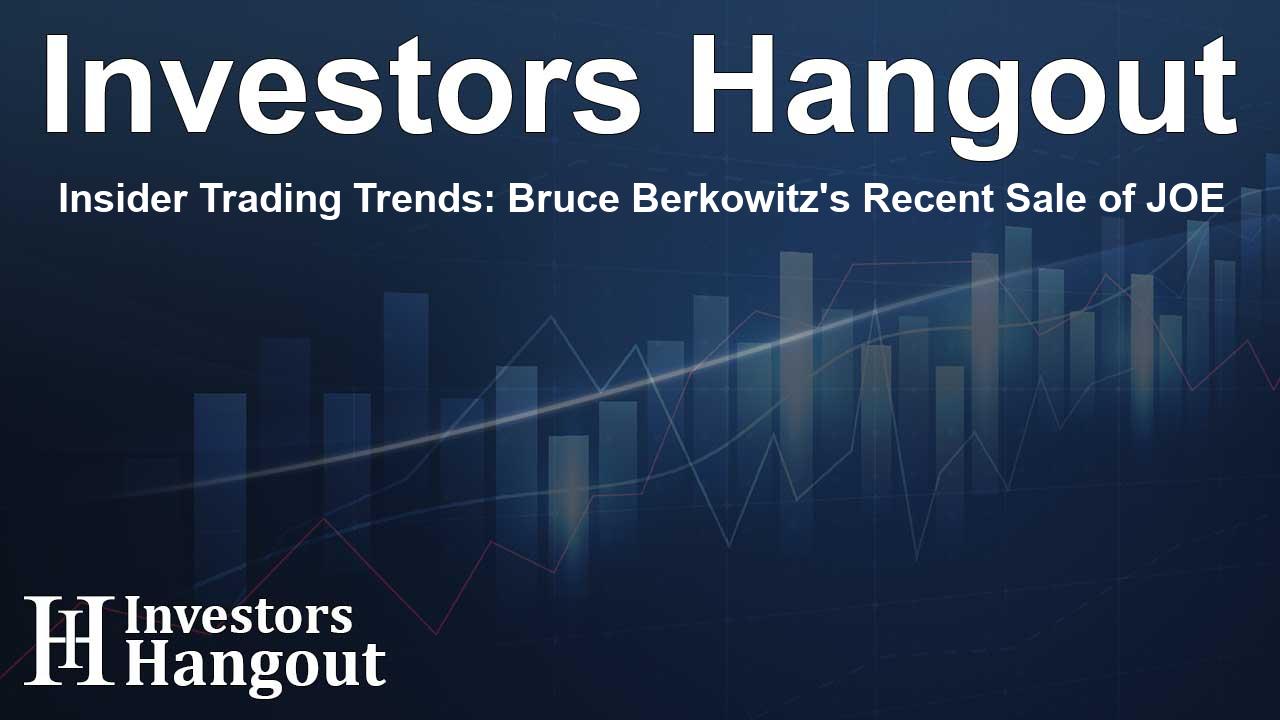Insider Trading Trends: Bruce Berkowitz's Recent Sale of JOE

Understanding Insider Trading and Its Implications
Recently, a notable transaction occurred involving BRUCE BERKOWITZ, the 10% owner of St. Joe (JOE), who disclosed an insider sale valued at $1.29 million. This event sheds light on insider trading practices, which can significantly influence investor sentiment and market perceptions.
Details of the Transaction
According to filings with the U.S. Securities and Exchange Commission, Berkowitz sold 25,300 shares of St. Joe. The sale price at the time of the transaction was recorded, signifying a calculated move in the stock market. St. Joe's shares are currently trading around $49.45, maintaining stability in the market.
Profile of St. Joe
The St. Joe Co is engaged in real estate development and asset management through various segments. Its operations are categorized into Residential, Hospitality, and Commercial sectors. The company is well-known for its unique offerings, including residential communities, hospitality experiences, and diverse commercial properties.
Analyzing St. Joe's Economic Impact
Revenue Growth: Recently, as of June, St. Joe reported an impressive revenue growth rate of 15.66%. This growth not only highlights the company's resilience but also indicates a robust performance relative to its competitors in the real estate sector.
Gross Margin: St. Joe boasts a gross margin of 42.91%, showcasing exceptional cost efficiency compared to industry standards. This suggests a strong capacity to manage expenses while maximizing profits.
Earnings per Share (EPS): St. Joe's current EPS stands at 0.51, positioning the company favorably within its sector and reflecting a positive trend in profitability.
Debt Management: St. Joe currently exhibits a debt-to-equity ratio of 0.83, which is higher than the industry average. This reliance on borrowed funds could indicate elevated financial risk, a crucial consideration for potential investors.
Exploring Valuation Metrics
The company's valuation is assessed using several key metrics:
Price to Earnings (P/E) Ratio: St. Joe's P/E ratio of 34.82 suggests that its stock may be overvalued relative to earnings potential.
Price to Sales (P/S) Ratio: With a P/S ratio of 6.75, the stock price reflects an elevated value compared to sales performance, which may warrant further scrutiny.
EV/EBITDA Ratio: St. Joe's EV/EBITDA ratio of 17.81 indicates a favorable market valuation, outperforming many in its industry.
Market Capitalization: St. Joe’s market capitalization, which exceeds industry averages, underlines its significant presence and prestige within the market landscape.
The Role of Insider Transactions in Investments
While insiders like Berkowitz often make trades based on personal or financial strategies, such actions are influential and can affect stock prices. When an insider, such as a major shareholder or executive, makes a trade, it can reveal their sentiment about the company’s future.
It's essential for investors to analyze insider transactions carefully. A purchase might signal confidence in the company’s prospects, whereas a sale could indicate the opposite, or it might simply be for personal finance reasons.
Frequently Asked Questions
What is insider trading?
Insider trading refers to the buying or selling of shares based on non-public information held by someone within the company. This is legal, as long as the insider properly reports the transactions.
Why is Bruce Berkowitz's sale significant?
Berkowitz's significant sale might signal various strategies, including profit-taking or rebalancing his investment portfolio. It's essential to consider the larger market context.
How does St. Joe's revenue growth compare to its competitors?
St. Joe has reported a revenue growth rate of 15.66%, which outpaces many of its competitors, indicating strong demand for its products and services.
What are the key metrics to watch for St. Joe?
Key metrics include the P/E ratio, gross margin, debt-to-equity ratio, and EPS. These provide insights into the company’s profitability, market valuation, and financial health.
What should investors consider regarding insider transactions?
Investors should consider the context of each transaction—whether it reflects confidence in the company’s direction or if it could indicate financial struggles. Proper due diligence is essential.
About The Author
Contact Riley Hayes privately here. Or send an email with ATTN: Riley Hayes as the subject to contact@investorshangout.com.
About Investors Hangout
Investors Hangout is a leading online stock forum for financial discussion and learning, offering a wide range of free tools and resources. It draws in traders of all levels, who exchange market knowledge, investigate trading tactics, and keep an eye on industry developments in real time. Featuring financial articles, stock message boards, quotes, charts, company profiles, and live news updates. Through cooperative learning and a wealth of informational resources, it helps users from novices creating their first portfolios to experts honing their techniques. Join Investors Hangout today: https://investorshangout.com/
The content of this article is based on factual, publicly available information and does not represent legal, financial, or investment advice. Investors Hangout does not offer financial advice, and the author is not a licensed financial advisor. Consult a qualified advisor before making any financial or investment decisions based on this article. This article should not be considered advice to purchase, sell, or hold any securities or other investments. If any of the material provided here is inaccurate, please contact us for corrections.
